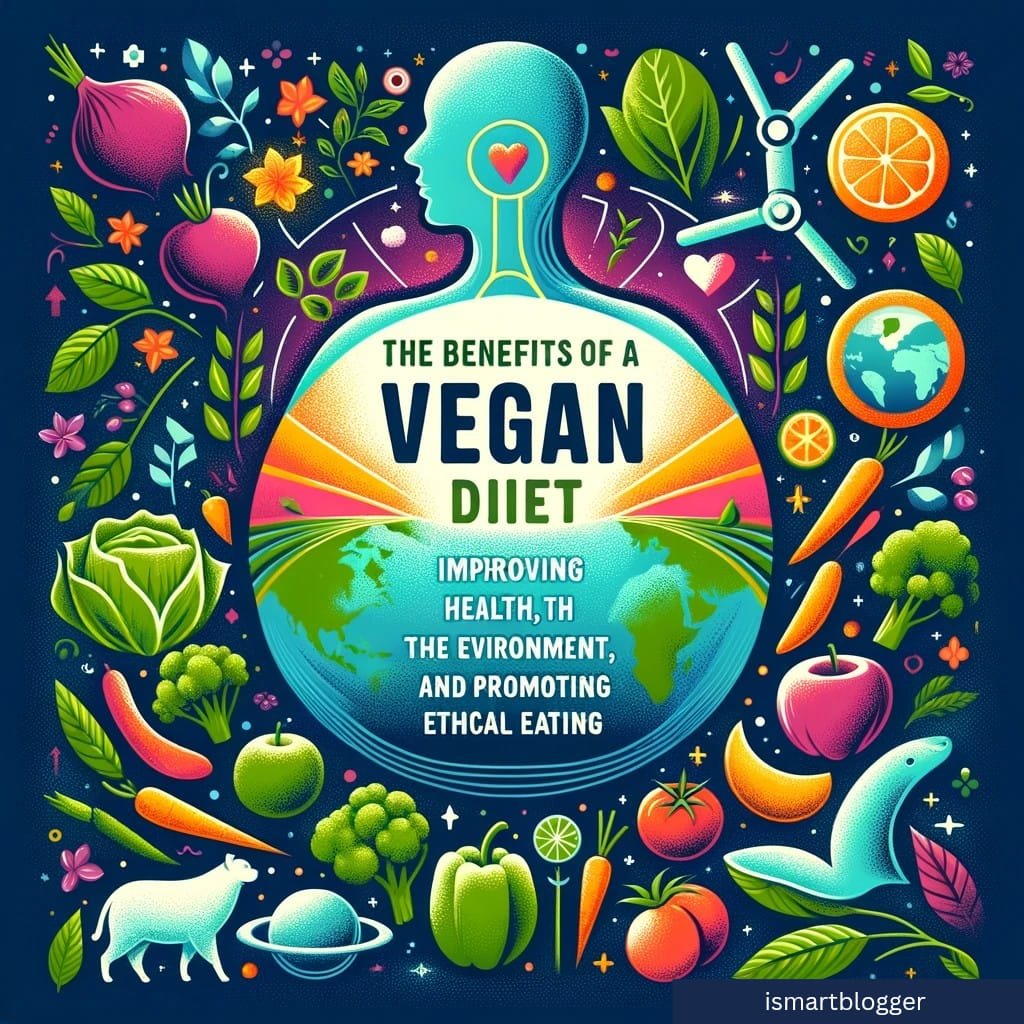Explore the multifaceted world of veganism—a dietary choice that’s gaining traction due to its health, environmental, and ethical perks. Unravel the benefits of a vegan diet, from improving personal health to reducing the environmental footprint and supporting ethical eating. Discover how a plant-based diet, known for reducing chronic diseases, contributes to a healthier lifestyle. Not only does it lessen greenhouse gas emissions and water usage but also minimizes animal suffering and exploitation. While contemplating a vegan lifestyle, consider the practical aspects and nutritionally rich plant-based sources. It’s a transition that can bring fulfillment while positively impacting personal health and the world at large.

Introduction:
As more people become aware of the impact of food choices on their health, the environment, and animal welfare, veganism is gaining popularity as a viable dietary option. A vegan diet is one that excludes all animal products, including meat, dairy, eggs, and honey, and instead relies on plant-based foods for nutrition. In this blog post, we will explore the benefits of a vegan diet, including its potential to improve health, protect the environment, and promote ethical eating.
Health Benefits of a Vegan Diet
A vegan diet has been shown to have many health benefits, including lower rates of chronic diseases such as heart disease, cancer, and diabetes. One reason for this is that a vegan diet is typically lower in saturated fat, which is found primarily in animal products and is linked to increased risk of heart disease. In fact, a 2019 study published in the Journal of the American Heart Association found that a plant-based diet was associated with a 16% lower risk of heart disease. Additionally, a vegan diet is typically higher in fiber, vitamins, and minerals, which can improve overall health and well-being.
Another benefit of a vegan diet is weight loss. Plant-based foods are typically lower in calories and higher in fiber than animal products, which can help with weight management. A 2016 study published in the Journal of General Internal Medicine found that people who followed a vegan diet for 18 weeks lost more weight than those who followed a standard American diet. Additionally, a vegan diet has been shown to improve digestion, reduce inflammation, and increase energy levels, which can all contribute to better health.
Environmental Benefits of a Vegan Diet
In addition to improving health, a vegan diet can also have a positive impact on the environment. Animal agriculture is a significant contributor to greenhouse gas emissions, which are a major driver of climate change. According to the United Nations Food and Agriculture Organization, animal agriculture is responsible for 14.5% of global greenhouse gas emissions. Additionally, animal agriculture uses large amounts of water and land, contributes to deforestation and biodiversity loss, and can lead to pollution of waterways and soil.
By choosing a vegan diet, individuals can reduce their environmental footprint and help to protect the planet. A 2018 study published in the journal Science found that a vegan diet could reduce greenhouse gas emissions by up to 73%, while a vegetarian diet could reduce emissions by up to 63%. Additionally, a vegan diet requires less water and land use than an animal-based diet, and can help to reduce deforestation and biodiversity loss.
Ethical Benefits of a Vegan Diet
Another important benefit of a vegan diet is its ethical implications. Animal agriculture is associated with animal suffering and exploitation, as animals are often confined in cramped, unsanitary conditions and subjected to inhumane treatment. By choosing a vegan diet, individuals can help to reduce the demand for animal products and support more ethical and sustainable food choices.
Additionally, a vegan diet promotes ethical eating by emphasizing the importance of considering the impact of food choices on animals and the environment. By choosing to eat plant-based foods, individuals can make a positive impact on the world and help to create a more sustainable and ethical food system.
Practical Considerations for a Vegan Diet
While a vegan diet can have many benefits, it is important to consider the practical aspects of transitioning to this way of eating. For example, it is important to ensure that the diet is nutritionally balanced and includes sufficient protein, iron, calcium, and other essential nutrients. Fortunately, there are many plant-based sources of these nutrients, such as legumes, tofu, leafy greens, nuts, and fortified foods.
It is also important to be mindful of meal planning and preparation to ensure that the diet is varied and satisfying. Experimenting with new recipes and ingredients can be a fun way to explore the world of vegan cuisine and discover new flavors and textures.
For those who are interested in transitioning to a vegan diet, it is important to do so gradually and with support. This can involve seeking guidance from a registered dietitian or joining a local vegan community to connect with others who share similar values and goals.
Conclusion
In conclusion, a vegan diet can have many benefits for health, the environment, and animal welfare. By choosing to eat plant-based foods, individuals can reduce their risk of chronic diseases, protect the planet, and support more ethical and sustainable food choices. While transitioning to a vegan diet can involve some practical considerations, it is a rewarding and fulfilling way of eating that can have a positive impact on the world. So why not give it a try and see how it can benefit you and the world around you?





